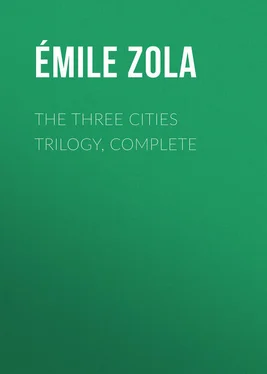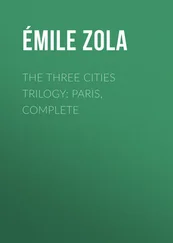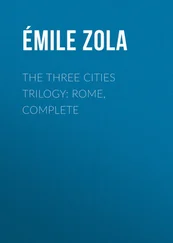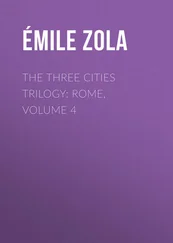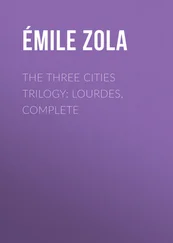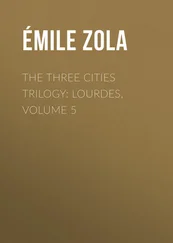Émile Zola - The Three Cities Trilogy, Complete
Здесь есть возможность читать онлайн «Émile Zola - The Three Cities Trilogy, Complete» — ознакомительный отрывок электронной книги совершенно бесплатно, а после прочтения отрывка купить полную версию. В некоторых случаях можно слушать аудио, скачать через торрент в формате fb2 и присутствует краткое содержание. Жанр: literature_19, foreign_antique, foreign_prose, на английском языке. Описание произведения, (предисловие) а так же отзывы посетителей доступны на портале библиотеки ЛибКат.
- Название:The Three Cities Trilogy, Complete
- Автор:
- Жанр:
- Год:неизвестен
- ISBN:нет данных
- Рейтинг книги:5 / 5. Голосов: 1
-
Избранное:Добавить в избранное
- Отзывы:
-
Ваша оценка:
- 100
- 1
- 2
- 3
- 4
- 5
The Three Cities Trilogy, Complete: краткое содержание, описание и аннотация
Предлагаем к чтению аннотацию, описание, краткое содержание или предисловие (зависит от того, что написал сам автор книги «The Three Cities Trilogy, Complete»). Если вы не нашли необходимую информацию о книге — напишите в комментариях, мы постараемся отыскать её.
The Three Cities Trilogy, Complete — читать онлайн ознакомительный отрывок
Ниже представлен текст книги, разбитый по страницам. Система сохранения места последней прочитанной страницы, позволяет с удобством читать онлайн бесплатно книгу «The Three Cities Trilogy, Complete», без необходимости каждый раз заново искать на чём Вы остановились. Поставьте закладку, и сможете в любой момент перейти на страницу, на которой закончили чтение.
Интервал:
Закладка:
The Fathers were even credited with a scheme of profound craftiness. They were supposed to have the secret idea of reserving Bernadette’s remains for themselves; the Sisters of Nevers having simply undertaken to keep it for them within the peaceful precincts of their chapel. Only, they were waiting, and would not bring it back until the affluence of the pilgrims should decrease. What was the use of a solemn return at present, when crowds flocked to the place without interruption and in increasing numbers? Whereas, when the extraordinary success of Our Lady of Lourdes should decline, like everything else in this world, one could imagine what a reawakening of faith would attend the solemn, resounding ceremony at which Christendom would behold the relics of the chosen one take possession of the soil whence she had made so many marvels spring. And the miracles would then begin again on the marble of her tomb before the Grotto or in the choir of the Basilica.
“You may search,” continued Doctor Chassaigne, “but you won’t find a single official picture of Bernadette at Lourdes. Her portrait is sold, but it is hung no where, in no sanctuary. It is systematic forgetfulness, the same sentiment of covert uneasiness as that which has wrought silence and abandonment in this sad chamber where we are. In the same way as they are afraid of worship at her tomb, so are they afraid of crowds coming and kneeling here, should two candles burn or a couple of bouquets of roses bloom upon this chimney. And if a paralytic woman were to rise shouting that she was cured, what a scandal would arise, how disturbed would be those good traders of the Grotto on seeing their monopoly seriously threatened! They are the masters, and the masters they intend to remain; they will not part with any portion of the magnificent farm that they have acquired and are working. Nevertheless they tremble – yes, they tremble at the memory of the workers of the first hour, of that little girl who is still so great in death, and for whose huge inheritance they burn with such greed that after having sent her to live at Nevers, they dare not even bring back her corpse, but leave it imprisoned beneath the flagstones of a convent!”
Ah! how wretched was the fate of that poor creature, who had been cut off from among the living, and whose corpse in its turn was condemned to exile! And how Pierre pitied her, that daughter of misery, who seemed to have been chosen only that she might suffer in her life and in her death! Even admitting that an unique, persistent will had not compelled her to disappear, still guarding her even in her tomb, what a strange succession of circumstances there had been – how it seemed as if someone, uneasy at the idea of the immense power she might grasp, had jealously sought to keep her out of the way! In Pierre’s eyes she remained the chosen one, the martyr; and if he could no longer believe, if the history of this unfortunate girl sufficed to complete within him the ruin of his faith, it none the less upset him in all his brotherly love for mankind by revealing a new religion to him, the only one which might still fill his heart, the religion of life, of human sorrow.
Just then, before leaving the room, Doctor Chassaigne exclaimed: “And it’s here that one must believe, my dear child. Do you see this obscure hole, do you think of the resplendent Grotto, of the triumphant Basilica, of the town built, of the world created, the crowds that flock to Lourdes! And if Bernadette was only hallucinated, only an idiot, would not the outcome be more astonishing, more inexplicable still? What! An idiot’s dream would have sufficed to stir up nations like this! No! no! The Divine breath which alone can explain prodigies passed here.”
Pierre was on the point of hastily replying “Yes!” It was true, a breath had passed there, the sob of sorrow, the inextinguishable yearning towards the Infinite of hope. If the dream of a suffering child had sufficed to attract multitudes, to bring about a rain of millions and raise a new city from the soil, was it not because this dream in a measure appeased the hunger of poor mankind, its insatiable need of being deceived and consoled? She had once more opened the Unknown, doubtless at a favourable moment both socially and historically; and the crowds had rushed towards it. Oh! to take refuge in mystery, when reality is so hard, to abandon oneself to the miraculous, since cruel nature seems merely one long injustice! But although you may organise the Unknown, reduce it to dogmas, make revealed religions of it, there is never anything at the bottom of it beyond the appeal of suffering, the cry of life, demanding health, joy, and fraternal happiness, and ready to accept them in another world if they cannot be obtained on earth. What use is it to believe in dogmas? Does it not suffice to weep and love?
Pierre, however, did not discuss the question. He withheld the answer that was on his lips, convinced, moreover, that the eternal need of the supernatural would cause eternal faith to abide among sorrowing mankind. The miraculous, which could not be verified, must be a food necessary to human despair. Besides, had he not vowed in all charity that he would not wound anyone with his doubts?
“What a prodigy, isn’t it?” repeated the doctor.
“Certainly,” Pierre ended by answering. “The whole human drama has been played, all the unknown forces have acted in this poor room, so damp and dark.”
They remained there a few minutes more in silence; they walked round the walls, raised their eyes toward the smoky ceiling, and cast a final glance at the narrow, greenish yard. Truly it was a heart-rending sight, this poverty of the cobweb level, with its dirty old barrels, its worn-out tools, its refuse of all kinds rotting in the corners in heaps. And without adding a word they at last slowly retired, feeling extremely sad.
It was only in the street that Doctor Chassaigne seemed to awaken. He gave a slight shudder and hastened his steps, saying: “It is not finished, my dear child; follow me. We are now going to look at the other great iniquity.” He referred to Abbe Peyramale and his church.
They crossed the Place du Porche and turned into the Rue Saint Pierre; a few minutes would suffice them. But their conversation had again fallen on the Fathers of the Grotto, on the terrible, merciless war waged by Father Sempe against the former Cure of Lourdes. The latter had been vanquished, and had died in consequence, overcome by feelings of frightful bitterness; and, after thus killing him by grief, they had completed the destruction of his church, which he had left unfinished, without a roof, open to the wind and to the rain. With what a glorious dream had that monumental edifice filled the last year of the Cure’s life! Since he had been dispossessed of the Grotto, driven from the work of Our Lady of Lourdes, of which he, with Bernadette, had been the first artisan, his church had become his revenge, his protestation, his own share of the glory, the House of the Lord where he would triumph in his sacred vestments, and whence he would conduct endless processions in compliance with the formal desire of the Blessed Virgin. Man of authority and domination as he was at bottom, a pastor of the multitude, a builder of temples, he experienced a restless delight in hurrying on the work, with the lack of foresight of an eager man who did not allow indebtedness to trouble him, but was perfectly contented so long as he always had a swarm of workmen busy on the scaffoldings. And thus he saw his church rise up, and pictured it finished, one bright summer morning, all new in the rising sun.
Ah! that vision constantly evoked gave him courage for the struggle, amidst the underhand, murderous designs by which he felt himself to be enveloped. His church, towering above the vast square, at last rose in all its colossal majesty. He had decided that it should be in the Romanesque style, very large, very simple, its nave nearly three hundred feet long, its steeple four hundred and sixty feet high. It shone out resplendently in the clear sunlight, freed on the previous day of the last scaffolding, and looking quite smart in its newness, with its broad courses of stone disposed with perfect regularity. And, in thought, he sauntered around it, charmed with its nudity, its stupendous candour, its chasteness recalling that of a virgin child, for there was not a piece of sculpture, not an ornament that would have uselessly loaded it. The roofs of the nave, transept, and apse were of equal height above the entablature, which was decorated with simple mouldings. In the same way the apertures in the aisles and nave had no other adornments than archivaults with mouldings, rising above the piers. He stopped in thought before the great coloured glass windows of the transept, whose roses were sparkling; and passing round the building he skirted the semicircular apse against which stood the vestry building with its two rows of little windows; and then he returned, never tiring of his contemplation of that regal ordonnance, those great lines standing out against the blue sky, those superposed roofs, that enormous mass of stone, whose solidity promised to defy centuries. But, when he closed his eyes he, above all else, conjured up, with rapturous pride, a vision of the facade and steeple; down below, the three portals, the roofs of the two lateral ones forming terraces, while from the central one, in the very middle of the facade, the steeple boldly sprang. Here again columns resting on piers supported archivaults with simple mouldings. Against the gable, at a point where there was a pinnacle, and between the two lofty windows lighting the nave, was a statue of Our Lady of Lourdes under a canopy. Up above, were other bays with freshly painted luffer-boards. Buttresses started from the ground at the four corners of the steeple-base, becoming less and less massive from storey to storey, till they reached the spire, a bold, tapering spire in stone, flanked by four turrets and adorned with pinnacles, and soaring upward till it vanished in the sky. And to the parish priest of Lourdes it seemed as if it were his own fervent soul which had grown and flown aloft with this spire, to testify to his faith throughout the ages, there on high, quite close to God.
Читать дальшеИнтервал:
Закладка:
Похожие книги на «The Three Cities Trilogy, Complete»
Представляем Вашему вниманию похожие книги на «The Three Cities Trilogy, Complete» списком для выбора. Мы отобрали схожую по названию и смыслу литературу в надежде предоставить читателям больше вариантов отыскать новые, интересные, ещё непрочитанные произведения.
Обсуждение, отзывы о книге «The Three Cities Trilogy, Complete» и просто собственные мнения читателей. Оставьте ваши комментарии, напишите, что Вы думаете о произведении, его смысле или главных героях. Укажите что конкретно понравилось, а что нет, и почему Вы так считаете.
